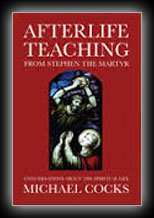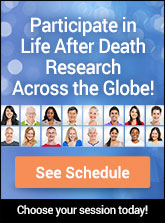
Afterlife Teaching From Stephen the Martyr
by Michael Cocks
2011
Early in 1974, a small group of religious friends began gathering periodically at the modest home of Thomas and Olive Ashman in Christchurch, New Zealand. “We would reverently pray for protection, and be silent,” says the Rev. Michael Cocks, an Anglican priest from Christchurch. “Tom would sit upright in a chair, relaxed. After two or three minutes he would begin to pale and to breathe deeply. Then his body would give a slight jerk as Stephen seemed to take over.”
In effect, Tom Ashman was a trance medium and was entering an altered state of consciousness as his body was being “taken over” by the entity called Stephen, who would then speak to the group using Ashman’s vocal cords. Stephen would dialogue with the group, which, in addition to Cocks and Ashman’s wife, Olive, also included a Liberal Catholic priest, a Buddhist, and other curious observers. But this was not just any Stephen; it was Saint Stephen, the first Christian Martyr.
Cocks states that normally Stephen spoke through Ashman in a “rather curious English,” but that he twice spoke in an ancient Greek dialect, which apparently was for the purposes of confirming his identity.
“For myself, I do not speak [English] and I never have,” Stephen related in one of the sittings. “I activate these words that are in Thomas’s memory and are known to him. Occasionally there is a little ‘magic,’ when I join together sounds and symbols that are in Thomas’s mind so that words may be spoken that are not known to Thomas.”
After one of the early sittings in which Stephen spoke in Greek, Cocks consulted a lecturer in Greek at a University about Stephen’s Greek words. “She reported my request to the then bishop, who called me for a chat,” Cocks recalls. “To him, I denied being interested in spiritualism, as was definitely the case in those days.”
In one philosophical discussion during 1973, Stephen offered an analogy in explaining why humans do not fully comprehend the physical life. He likened God to a surgeon. “…think how a surgeon would act if, when he had to operate, he had to keep the patient conscious, adjust mirrors so the patient could see the operation that would be beyond his understanding in any case. Should he perhaps have each patient undertake advanced studies before an operation? Or would it perhaps not be better only to operate on a surgeon?” Stephen went on to say that the complexity is such that the patient must trust his surgeon.
Some of what Stephen had to say:
Purpose of life: “Remember, that in the beginning there was the coming away from the Source, for the correction of many disorders…Acquiring a physical body is only one stage in the corrections…It seems a contradiction in itself, unless you understand, that it is for this reason each and every one of you is in the position that you are, for the reason that you may develop; that disorder may be corrected. Each is in the situation where he must learn, develop and correct disorder.”
On the afterlife: “Think not that when you are without your body, you are going to be much different, for your needs are different. Except through feelings there is little association, for your tasks and your needs are no longer what they were, and the tasks and needs of them that are still in the body are different. These are the first things you learn.”
On reincarnation: “The answer is most difficult. The understanding of the phenomenon is sometimes beyond even myself, but hear me now. Even as I speak through this body, I am Stephen and reincarnate possibly a thousandfold. The confusion is not in the reality of this. It is on the concept of your conscious mind where it can but think of one body.”
